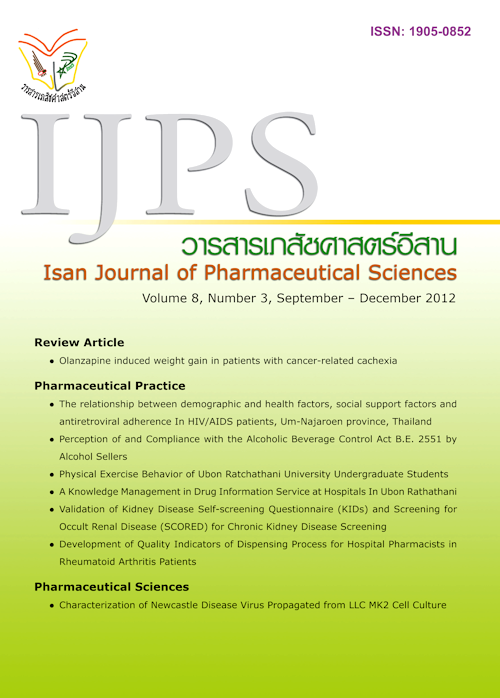A Knowledge Management in Drug Information Service at Hospitals in Ubon Ratchathani
Main Article Content
Abstract
Introduction: The application of knowledge management (KM) in the drug information service (DIS)will enhance the DIS to effi ciently achieve its aims. This will lead to accurate information being provided at thepoint of need to healthcare professionals and patients, improving rational drug use. Method: This research was adescriptive study using questionnaires. The study was focused on the DIS of pharmacy departments at hospitals inUbon Ratchathani. Result: The response rate was 85 % (N = 20). The KM of the drug information services mostlyhad the necessary knowledge that was consistent with achieving the goals of the organization (31%), cooperatingin the pharmacy department in creating and searching knowledge (56%). The majority of drug information servicecreated and searched knowledge through conferences/seminars/workshops (81%). The pharmacist was responsiblefor storing knowledge (50%) in printed form (88%) and electronic form (63%). Communicating and sharing ofknowledge was mostly via documents such as notes, letters (88%). The knowledge was utilized for staff development(100%), work development (94%) and organization development (88%). The problems in knowledge managementwere in knowledge identifi cation, communicating and sharing of knowledge, the application of knowledge andsupporting factor of KM were in high level. The problems of creating and searching the knowledge were in moderatelevel. Conclusion: Most DIS at hospitals in Ubon Ratchathani did not have a policy on knowledge managementfor knowledge transfer, there was no clear model of KM. However, there were activities that were consistent withthe KM process, including determining knowledge, creating and searching knowledge, storing knowledge, sharingknowledge, and knowledge application. In order to empower and enhance effectiveness of drug information servicefor routine work in hospitals, KM models should be developed systematically and a knowledge sharing networkshould be established among hospitals in Ubon Ratchathani.
Article Details
In the case that some parts are used by others The author must Confirm that obtaining permission to use some of the original authors. And must attach evidence That the permission has been included
References
American Society of Health-System Pharmacists. Guide-lines minimum standard for pharmaceutical services in ambulatory care. Am j health-syst pharm. 1999; 56: 1744-47.
International Pharmaceutical Federation (FIP). Require-ment for Drug information Centres [online]. 2005 Sep 5 [cited 2010 May 10]. Available from: http://www.fip.org/files/fip/PI/RequirementsforDrugInformationCentres.pdf.
Julinton T. A Processes and success factors of knowl-edge management in organizations: Case study of Mental Health Center, Department of Mental Health [Thesis for the degree of Master of Arts in Social Development Administration] Bangkok: NIDA; 2006.
Junsri K. Astudy of the actualization of knowledge management in nursing at Pharmongkutklao Hospital [Thesis for the degree of Master of Education in Human Resources Development] Bangkok: Ramkhamhaeng University; 2009.
Lorsuwannarat T. Information system for management. 6thed. Bangkok: Sat Four Pringting; 2004
Musigapong P. The condition of knowledge management and the needs in increasing knowledge to the learning organization of the personnel in health service system development bureau, Department of Health Service Support, Ministry of Public Health [Thesis for the degree of Master of Business (Administration in General Management)] Bangkok: Pharanakorn Rajabhat University; 2007.
Namprasertchai S. Technology and Knowledge Management[Online]. 2006 [Cited 2009 Oct 15]. Available from: http://www.vet.cmu.ac.th/KM/document/Tech_KM.pdf.
O’Dell C, Grayson CJ. If only We Knew What We Know: Identifi cation and Transfer of Best Practice. California Management Review 1998; 40(1).
Pakasakulwong A. Direcion of Knowledge Management in Pharmacy Department of Romchat Hospital, Muang District, Nakahon Sawan Province [Thesis for the degree of Master of Arts (Development strategy)]. Nakhon Sawan: Nakhon Sawan Rajabhat University; 2007
Panich W. Knowledge management: Practitioners. Bankok: Sukkhapabjai; 2005
Riensavapak S., Maneewattana S, Lovichit T., Sanguan-roongvong J., Chiaowanich K., and Kobkuwat-tana Ti. Knowledge management. Bangkok: K. Ponpim; 2007.
Somsaman T. A Structure and process of knowledge management in organizations: Case study in Yala Provincial Health Office [Thesis for the degree of Master of Arts in Social Development Administration] Bangkok: NIDA; 2005.
South African Association of Hospital and Institutional Pharmacists. Practice standard for provision of drug information services [Online]. 2007 Nov 11 [cited 2010 Oct 15]. Available from: http://www.saahip.org.za/docs/practicestd-druginfo.html.
The Association of Hospital Pharmacy (Thailand). Standard practice guideline of hospital pharmacy. Bangkok: Chanmuang; 1999.
Tungsateanrapap W., Rengpinit P., Phongtong T. Serveying of drug information desire and information source in (Public) Hospitals in Khon Kaen province. Srinagarind Med J.1998; 13(1): p 24-9
Wanitchareonchai W. Development of knowledge creation systems using team learning methods for nursing instructors in higher education institutions [Thesis for the degree of Doctor of Philosophy (Educational Technology and Communications)] Bangkok: Chulalongkorn University; 2005.
Wicharn B. Knowledge management in action. Bangkok: Expernetbooks; 2004
Ying K. The exploration on the realization and practice of knowledge management between middle level managers and basic level nurses based on the example: The nursing department of one hospital in the south of Taiwan [online]. 2004 [cited 2010 Sep 15]. Available from: etd.lib.nsysu.edu.tw/ETD-db/ETD-search/view-etd?VRN=etd-0126105-194108.
Yodnoppaklao N. A Knowledge management of Surin Ruam Phaet Hospital [Thesis for the degree of Master of Business Administration] Mahasarakham: Mahasarakham University; 2005

